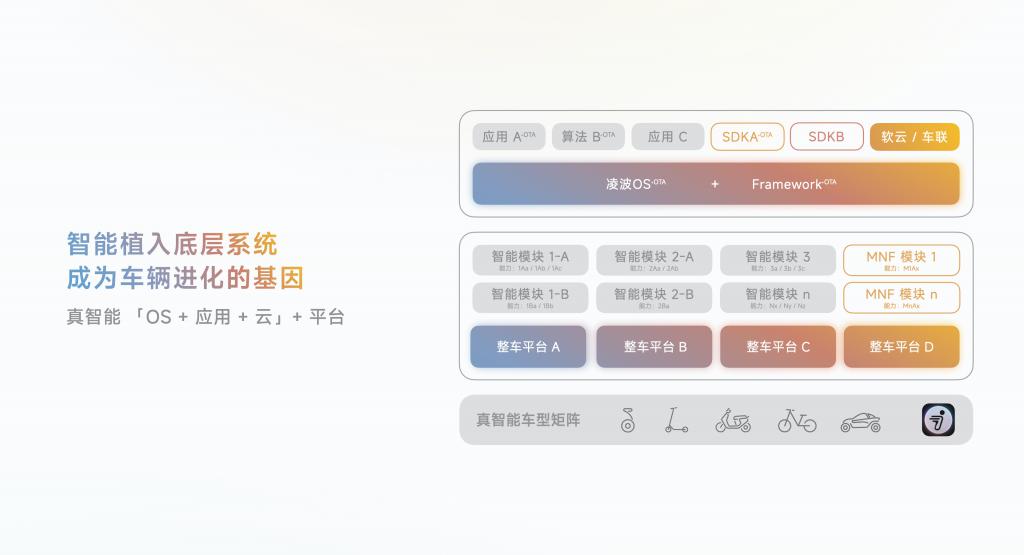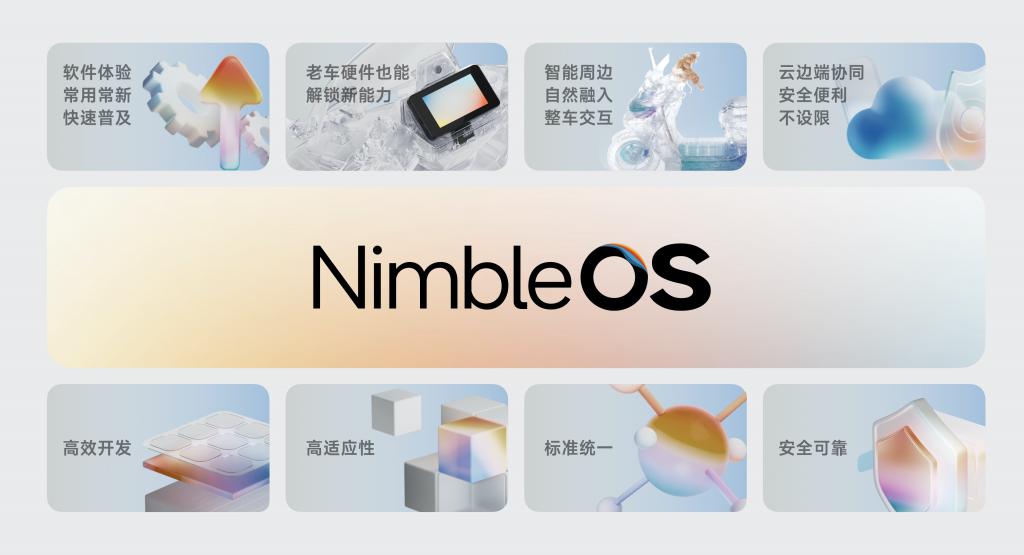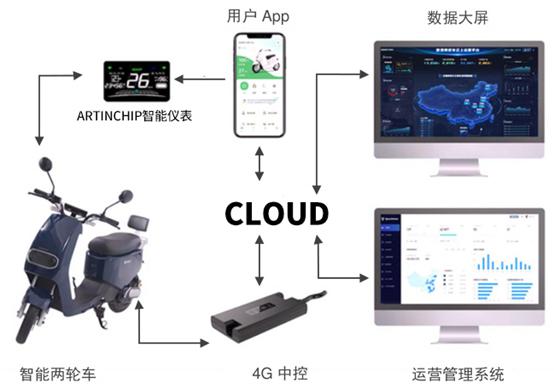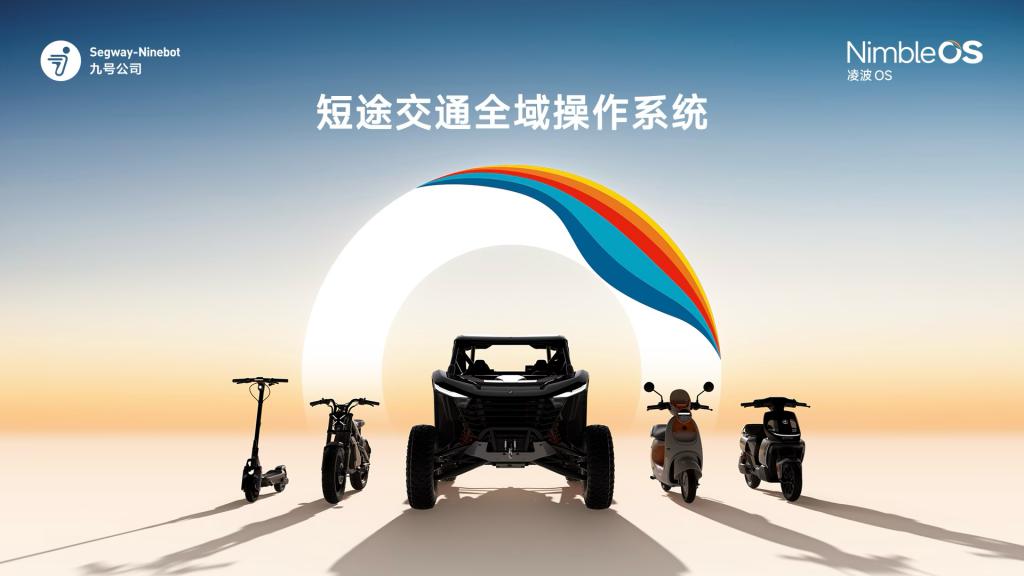To evolve from a "means of transportation" to a "smart terminal," what do electric two-wheelers need?
On August 26th, Ninebot provided the answer—its self-developed NimbleOS, covering all new and old Ninebot models and unlocking more intelligent features.
Similar to Huawei's HarmonyOS and Xiaomi's Surge in the smartphone industry, Ninebot has launched the country's first all-encompassing operating system specifically designed for the two-wheeled short-distance travel sector. Centered on the core features of "continuous upgrades, capability integration, and cloud-edge-end collaboration," it builds an intelligent ecological foundation covering all scenarios of short-distance transportation.
With the support of the Lingbo OS, Ninebot’s latest M5 series smart electric scooters deliver a “fully equipped smart” experience for users: all models come standard with a 5-inch TFT RideyFUN intelligent driving system, Mole Control program, and True Intelligence 3.0 system. Newly added features include Player Mode and Hill Descent Control, along with support for customizable riding parameters and the ability to handle complex road conditions.
The simultaneous launch of the Lingbo OS and the M5 series of smart electric scooters not only marks the two-wheeler mobility industry’s official entry into a new stage of intelligent ecosystems centered around operating systems, but also signifies that industry competition has officially entered a new phase where software defines the user experience.
Over a decade of technological accumulation, Lingbo OS is both a milestone and a new starting point.
Gao Lufeng, the chairman of Ninebot, once revealed that Ninebot's strategic moves are forward-looking, considering matters five years down the line, which is also the reason why its intelligent strategy can be executed with determination.
In fact, even before officially entering the two-wheeled electric vehicle industry in 2019, Segway-Ninebot had already proposed the concept of a "robotic two-wheeled vehicle." "Using robotic technology, employing robots' environmental perception and human-machine interaction technology to make the transportation experience better and more intuitive," which can be regarded as laying the foundation for the underlying logic of the OS.
Afterwards, through the era marked by keyless unlocking as True Intelligence 1.0 and the era of "software-defined riding" as True Intelligence 2.0, Ninebot's latest launch, the Lingbo OS, signifies a milestone in entering the True Intelligence 3.0 stage, leveraging over 10 years of technological accumulation to build an open ecosystem and enable continuous evolution of vehicles.
According to the introduction, Lingbo OS is derived from "Lingbo Weibu," symbolizing the system's light and swift operation; the English name "Nimble" also means agile and intelligent. Ninebot's CTO Liu Miao stated that Lingbo OS has four major technical advantages for the company.
Improving development efficiency: Unified architecture combining cloud and app for rapid development; High adaptability: Analogous to the automotive Autosar architecture but more lightweight, adapted to the low computing power requirements of two-wheeled vehicle terminals, while also integrating with the cloud; Standardization: Entirely self-developed system, components developed based on a unified "DNA" to avoid transplantation rejection, ensuring seamless data and algorithm interoperability; Safe and reliable: Built in accordance with automotive functional safety standard ISO26262.

Lingbo OS enables users to experience a more relaxed and smoother ride: features like seamless unlocking, mole control, and ramp assistance operate more smoothly; significantly enhancing vehicle stability and safety control in complex road conditions. Additionally, Lingbo OS supports whole vehicle OTA upgrades, allowing even older models to be continuously updated, greatly enhancing the long-term value for users.

OS and chips develop in parallel, Ninebot deepens collaborative development through industrial investment.
It should be noted that the relationship between the operating system and the chip is by no means a simple "upper-layer software" and "underlying hardware" relationship, but rather a deeply intertwined, interdependent, and co-evolving symbiotic relationship: the chip provides the physical capabilities for computation, while the operating system offers the intelligence to manage and schedule these capabilities.
The close collaboration between the operating system and the chip ultimately determines whether the terminal device is smooth, stable, secure, and efficient. Almost any major breakthrough in computing technology is inevitably accompanied by innovations in both areas. Ninebot, well aware of this, naturally values this aspect in the long-term industry collaboration process. Therefore, deepening cooperation through industrial investment is the best path forward.
On June 13th of this year, a chip solution provider, supported by its D series chips, launched a two-wheeler mobile interconnection feature. This feature aims to reshape the riding experience through four core scenarios: screen mirroring, navigation projection, remote control, and intelligent vehicle search. It also achieved the "mobile - vehicle - cloud" data closed loop for the first time.

Currently, ZeroG's cooperation with the upstream chip industry is mainly focused on three areas: human-computer interaction, hardware bus transmission, and motor control.
Taking the hardware bus transmission as an example, this is one of the most direct connections between the newly launched Lingbo OS by Company Nine and the chip company. "The bus transmission protocol defined by Lingbo OS can perform hardware parsing, which means the processing capability of the main processor is no longer needed for protocol parsing, thus enhancing communication capability between nodes. Of course, this is just one part of it."
According to Xu Chao, Zero Extreme has previously established a deep cooperation with the chip company in the field of human-computer interaction. Currently, its chip products have been applied on a large scale in some models of Ninebot that are in mass production.
"The ultimate goal of intelligence is the operating system and chips," and the deployment of Lingbo OS and related upstream is precisely an interpretation of this direction. In the future, there will also be more in-depth and extensive cooperation in the entire upstream of intelligence and electrification.
The official announcement from the chip company mentioned that its chip product solutions have been successfully applied to a leading two-wheeled electric vehicle company, with an expected deployment exceeding one million units by 2025. It is not difficult to see that this company might be Ninebot.
Reshaping the competitive landscape, the two-wheeler product enters the "software-defined" new era.
Currently, China's electric two-wheeler industry is at a critical stage of transformation and upgrading.
"Parameter competition" and "product homogenization" phenomena have led to a continuous narrowing of profit margins in the channels. At the same time, driven by the rise of new consumer demands, policy guidance, and technological innovation, the industry is ushering in a new round of development opportunities.
Meanwhile, on September 1st of this year, the new national standards for electric two-wheelers will also be fully implemented. According to industry forecasts, the new regulations will facilitate the orderly phasing out of nearly 200 million non-compliant vehicles nationwide and create a replacement market demand of over 30 billion yuan.
The competition in the electric two-wheeler industry urgently needs to shift from the past "mechanical war" to a more in-depth and broader "ecosystem war." According to Segway-Ninebot, future competition will no longer be limited to hardware parameters such as battery capacity or power performance, but will instead focus more on the capabilities of "software experience" and "ecosystem services."
The release of Lingbo OS is not only an important step in the evolution of No. 9's products but also a critical milestone for the entire industry in moving towards the "software-defined vehicle" era. It enables vehicles to truly gain the capability for continuous evolution and marks the official entry of two-wheel travel into a new stage of iterability and expandability in intelligence.

It can be anticipated that with the expansion and implementation of the Lingbo OS intelligent ecosystem, Segway-Ninebot, transitioning from product innovation to system innovation, may tap into a larger market in terms of software services, data value, and ecosystem benefits.
This is precisely what Guosen Securities' latest research report states: "Ninebot is evolving from a hardware manufacturer to a provider of intelligent mobility solutions," providing yet another example.











